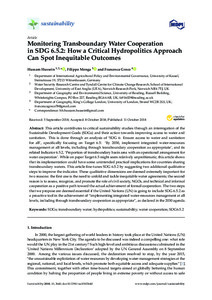Monitoring Transboundary Water Cooperation in SDG 6.5.2: How a Critical Hydropolitics Approach Can Spot Inequitable Outcomes
| dc.date.accessioned | 2019-01-31T10:11:24Z | |
| dc.date.available | 2019-01-31T10:11:24Z | |
| dc.date.issued | 2018-10-11 | |
| dc.identifier | doi:10.17170/kobra-20190130126 | |
| dc.identifier.uri | http://hdl.handle.net/123456789/11048 | |
| dc.description.sponsorship | Gefördert durch den Publikationsfonds der Universität Kassel | |
| dc.language.iso | eng | |
| dc.rights | Urheberrechtlich geschützt | |
| dc.rights.uri | https://rightsstatements.org/page/InC/1.0/ | |
| dc.subject | SDGs | eng |
| dc.subject | transboundary water | eng |
| dc.subject | hydropolitics | eng |
| dc.subject | sustainability | eng |
| dc.subject | water cooperation | eng |
| dc.subject | SDG6.5.2 | eng |
| dc.subject.ddc | 630 | |
| dc.title | Monitoring Transboundary Water Cooperation in SDG 6.5.2: How a Critical Hydropolitics Approach Can Spot Inequitable Outcomes | eng |
| dc.type | Aufsatz | |
| dcterms.abstract | This article contributes to critical sustainability studies through an interrogation of the Sustainable Development Goals (SDGs) and their action towards improving access to water and sanitation. This is done through an analysis of ‘SDG 6: Ensure access to water and sanitation for all’, specifically focusing on Target 6.5: ‘By 2030, implement integrated water-resources management at all levels, including through transboundary cooperation as appropriate’, and its related Indicator 6.5.2, ‘Proportion of transboundary basin area with an operational arrangement for water cooperation’. While on paper Target 6.5 might seem relatively unproblematic, this article shows that its implementation could have some unintended practical implications for countries sharing transboundary waters. This article fine-tunes SDG 6.5.2 by suggesting two additional qualitative steps to improve the indicator. These qualitative dimensions are deemed extremely important for two reasons: the first one is the need to unfold and tackle inequitable water agreements; the second reason is to assess, recognize, and promote the role of civil society, NGOs, and technical and informal cooperation as a positive path toward the actual achievement of formal cooperation. The two steps that we propose are deemed essential if the United Nations (UN) is going to include SDG 6.5.2 as a proactive tool in the achievement of “implementing integrated water-resources management at all levels, including through transboundary cooperation as appropriate”, as declared in the 2030 agenda. | eng |
| dcterms.accessRights | open access | |
| dcterms.creator | Hussein, Hussam | |
| dcterms.creator | Menga, Filippo | |
| dcterms.creator | Greco, Francesca | |
| dc.relation.doi | doi:10.3390/su10103640 | |
| dc.type.version | publishedVersion | |
| dcterms.source.identifier | EISSN: 2071-1050 | |
| dcterms.source.issue | 10 | |
| dcterms.source.journal | Sustainability | |
| dcterms.source.pageinfo | 3640 | |
| dcterms.source.volume | 2018 |
Dateien zu dieser Ressource
Das Dokument erscheint in:
-
Artikel [1169]

